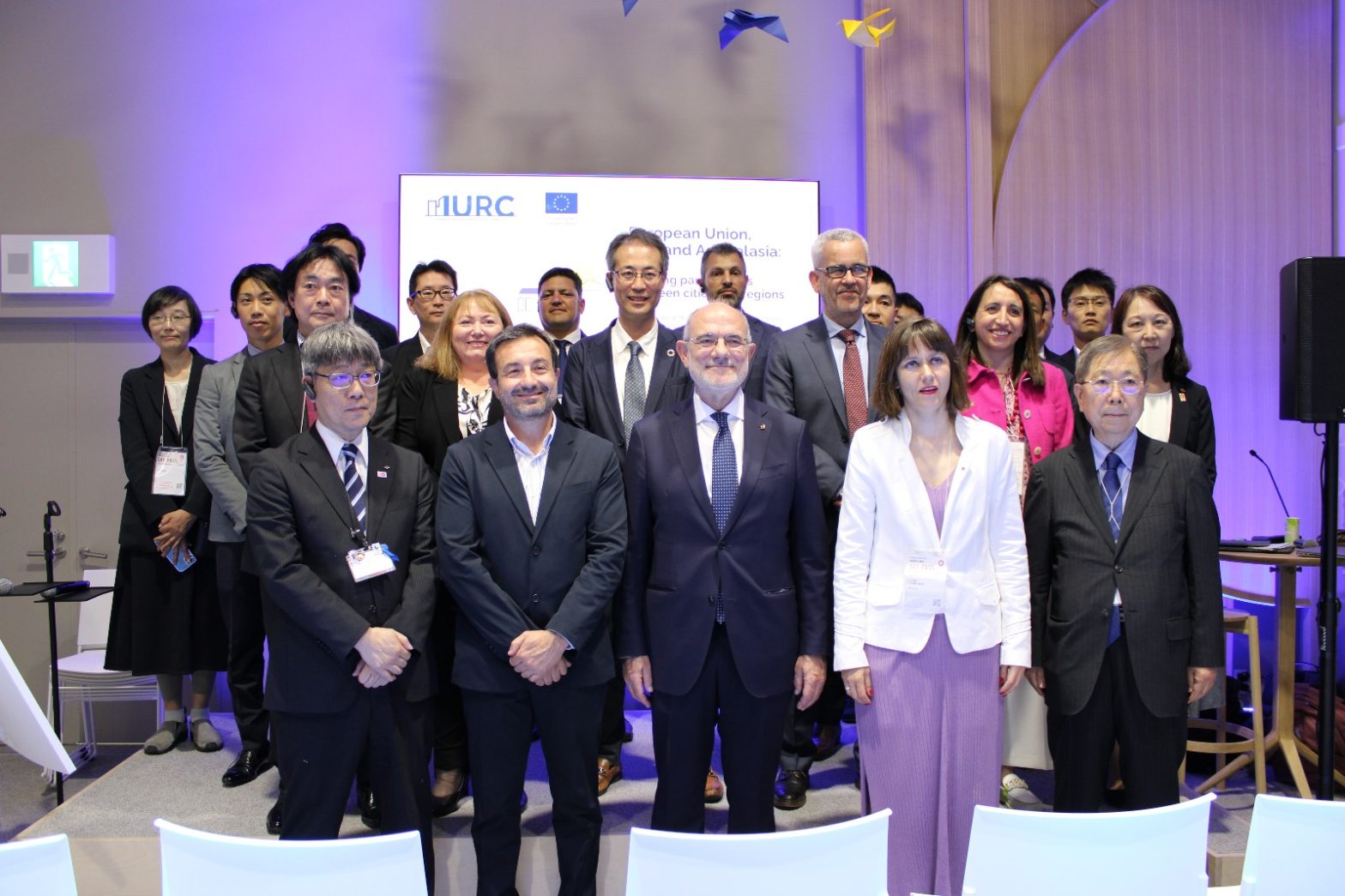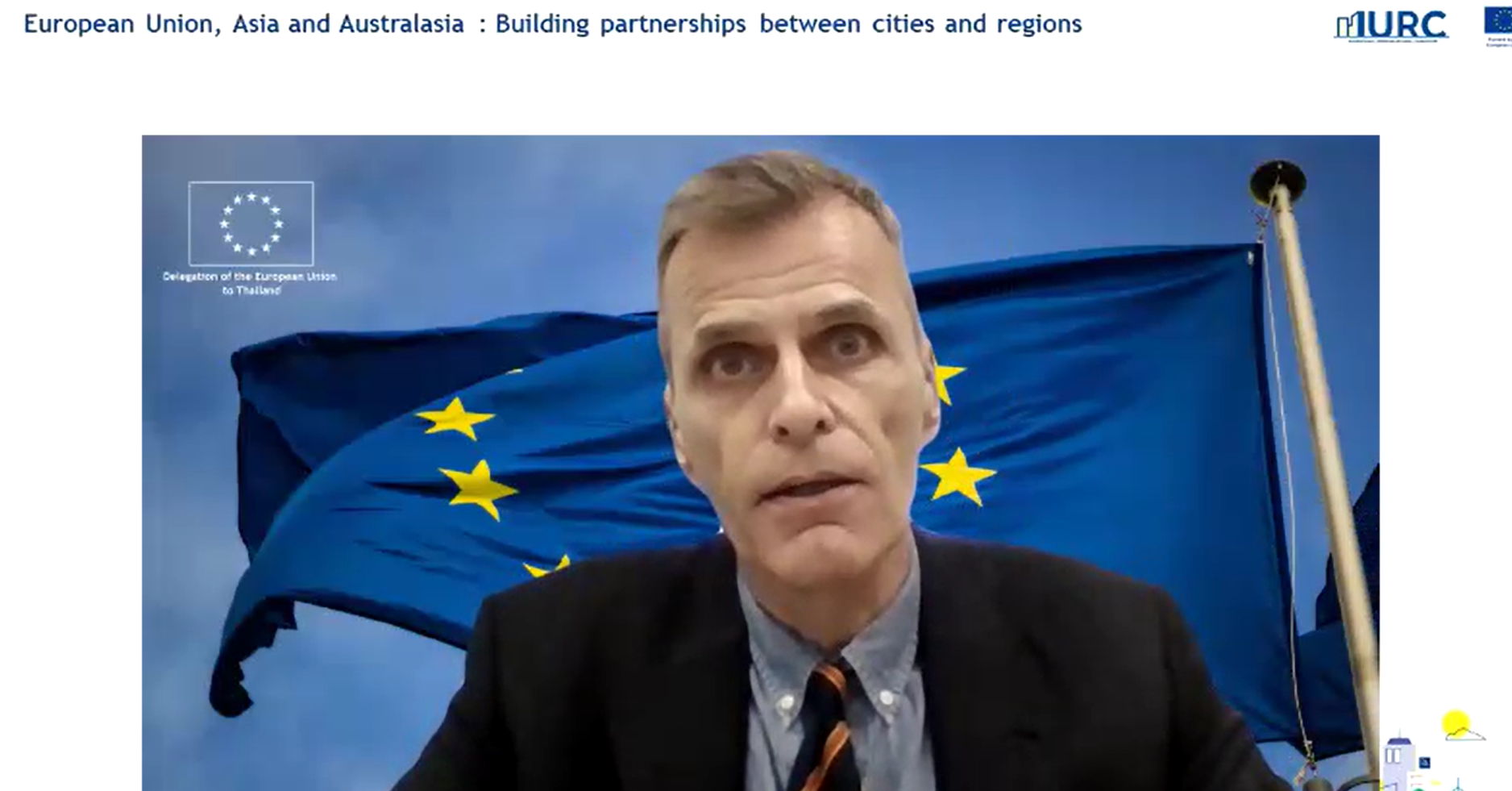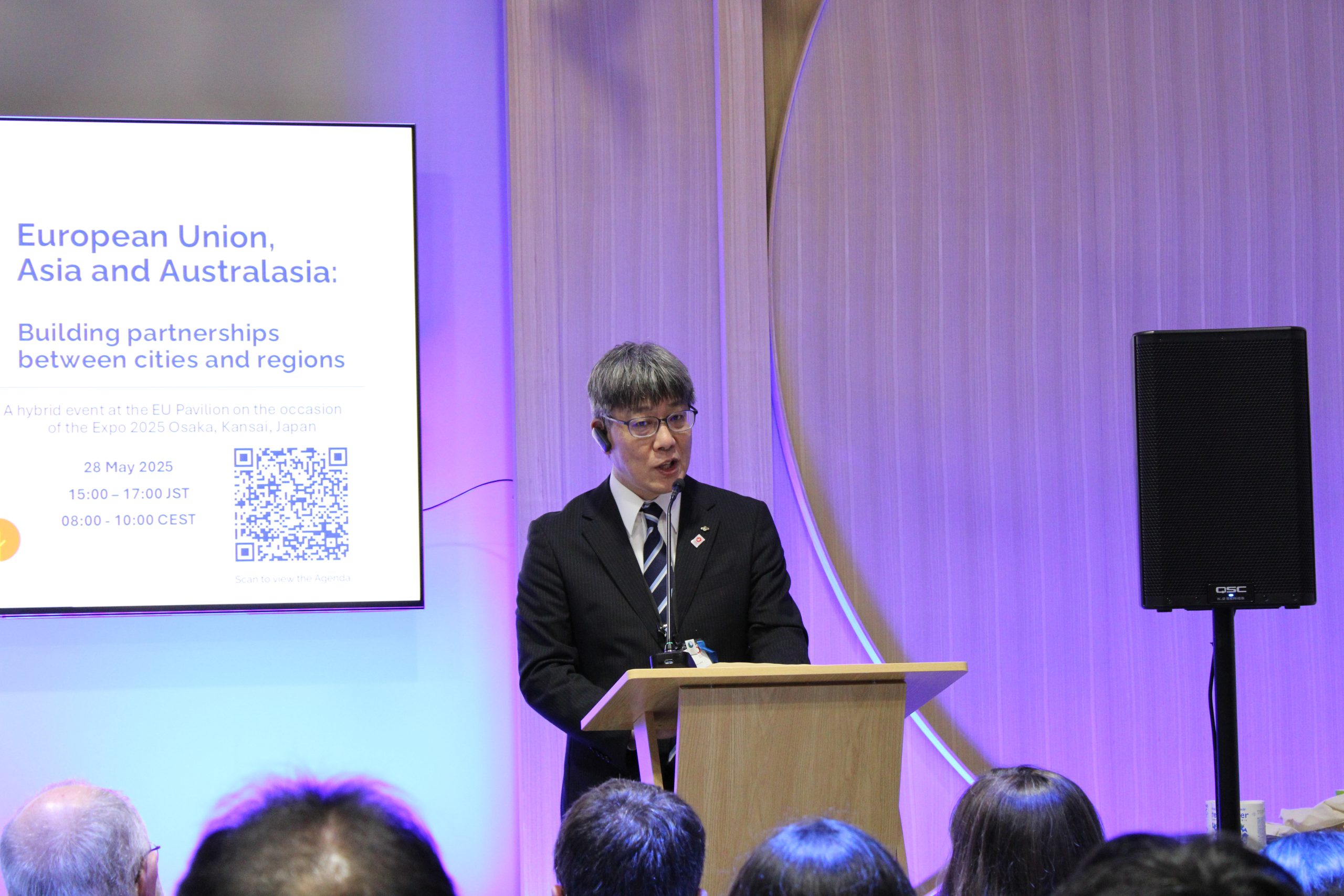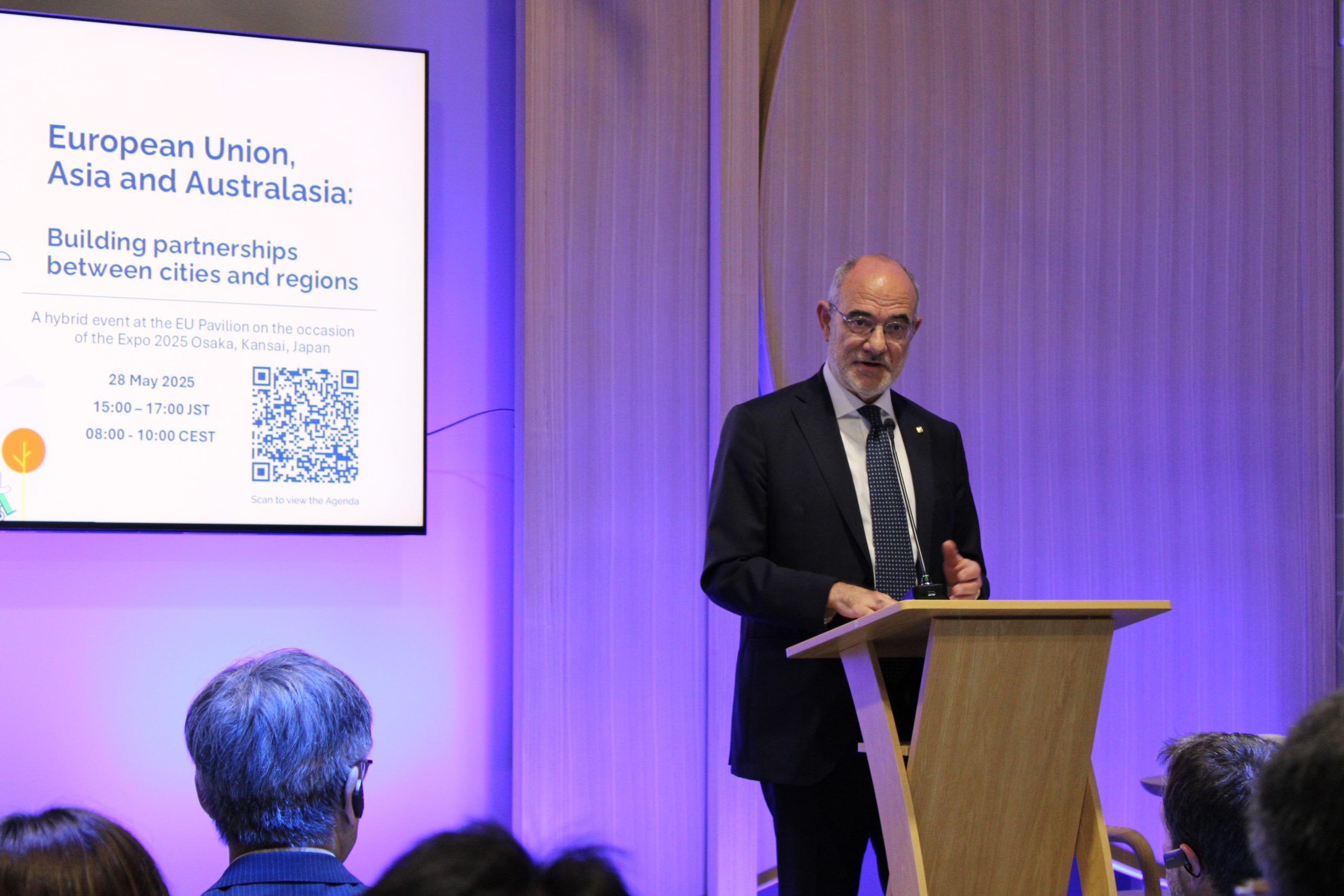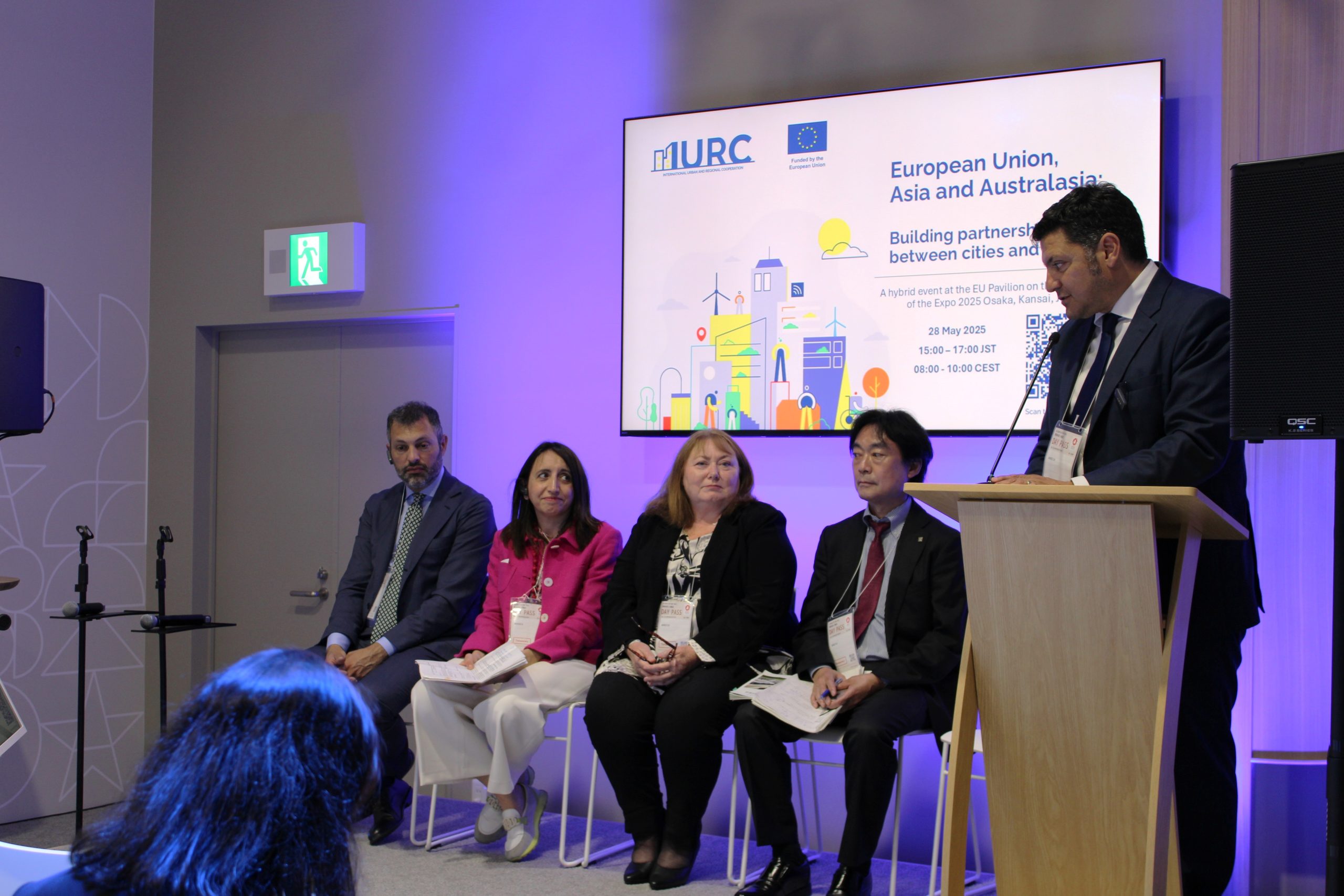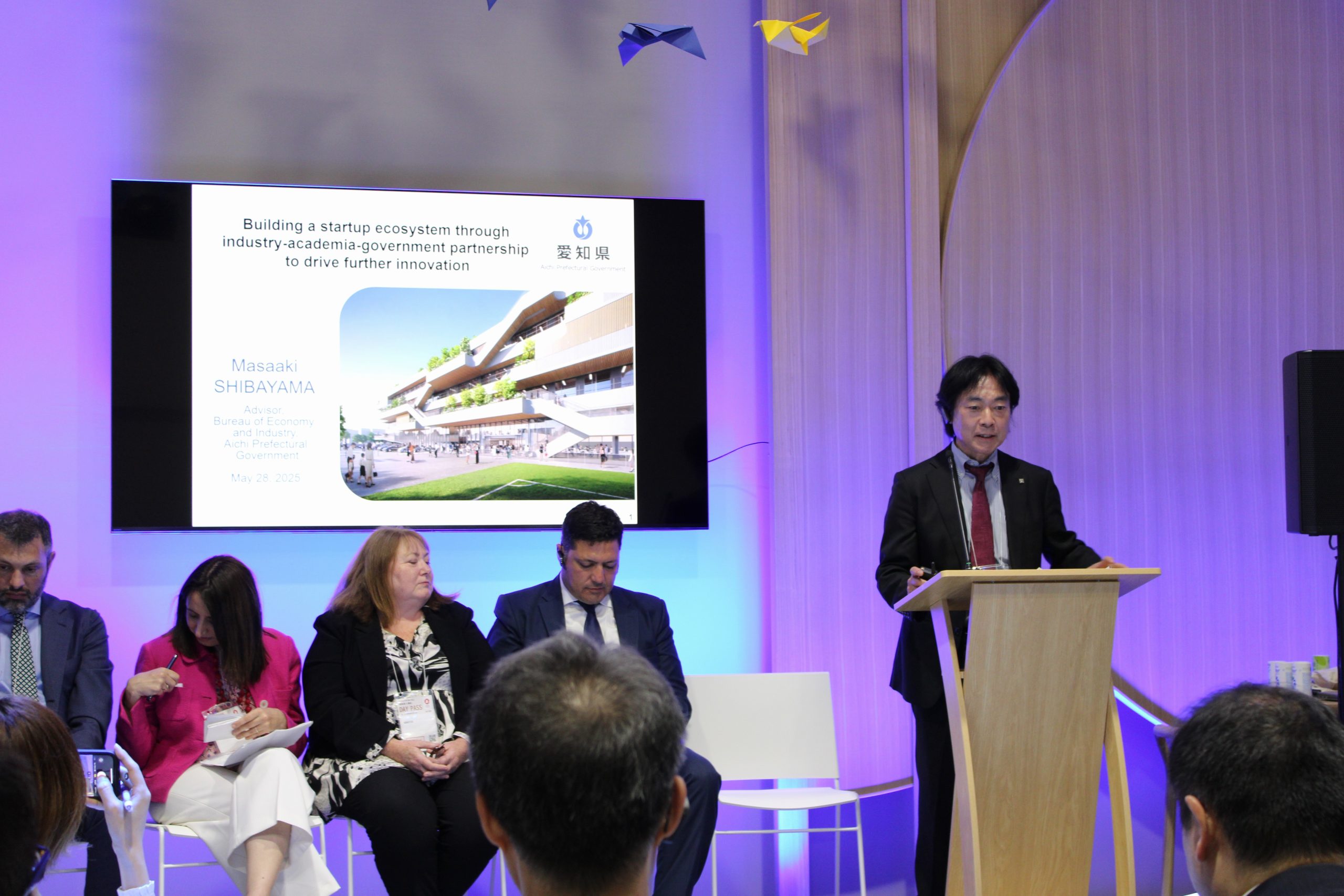Over 150 participants joined the virtual Hybrid Launch of the IURC Asia and Australasia (AA) at the EU Pavilion on the occasion of Expo 2025 Osaka, Kansai, Japan, on 28 May 2025.
The event provided an opportunity to deep dive into the international dimension of the European cohesion policy, focusing on the priorities for cities and regions in the current framework 2021-2027. Involving leaders from four regions and municipalities participating in the IURC project, the seminar highlighted practical examples, challenges and success stories of the cooperation. The event showcased how cities and regions can leverage global partnerships to create added value, inspire innovation, and drive meaningful economic development. It was moderated by Prof. Hidefumi Imura, IURC Japan coordinator and supported by the IURC Japan helpdesk.
Thematically, the seminar covered several areas of the city-to-city and region-to-region cooperation explored in the IURC project, including smart city, energy transition, adaptation to climate change, industrial modernisation, innovation ecosystems and foodtech. The seminar promoted the open call for EU cities and regions to apply for IURC participation (see online EU survey form, deadline 30 June 2025).
Opening Session
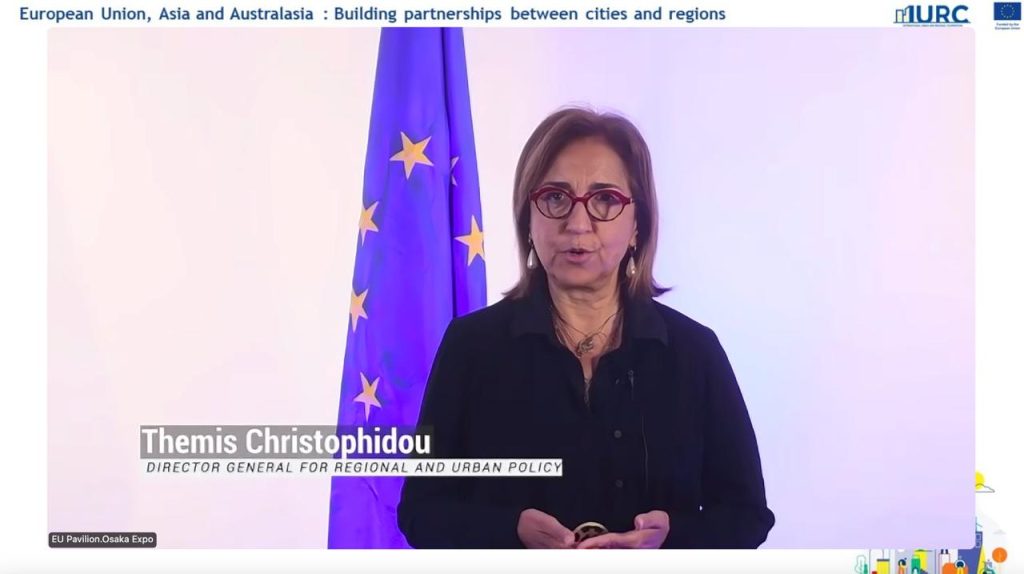
Ms. Themis Christophidou, Director-General, European Commission, DG REGIO, delivered a video message to both in-person and virtual audiences, announcing the official launch of the IURC Asia and Australasia (2025–2027) programme. Ms Christophidou referred to the cooperation with Japan, which enabled over 20 partnerships between cities and regions in the EU and Japan since 2017, plus many more with cities and regions in Asia and Australasia. Profound partnerships with lasting impact, a bridge of understanding and shared solutions is what the IURC programme is about, she said. These collaborations focus on areas like climate action, green technologies, and urban living conditions, drawing on Europe’s strong experience in urban and regional development. Through European cohesion policy, cities and regions play a key role in driving economic, social, and territorial development, Ms. Christophidou stated.
The previous phase of the IURC Asia and Australasia (AA) (2021–2024) led to several notable success stories. Ms Christophidou mentioned examples from Hamburg, Germany, which collaborated with Melbourne, Australia, on digital urban planning initiatives, while cities in France and Germany partnered with counterparts in Japan, Korea, and New Zealand to promote the energy transition and innovation through business collaboration. The Milan Urban Food Policy Pact was expanded to cities such as Bangkok, fostering broader regional adoption. A joint venture led by Christchurch, New Zealand, brought together cities from Korea, Australia, and Thailand to create a framework for urban action that promotes smart citizen engagement. Additionally, students from Portugal and Malaysia worked together on climate projects, and universities from Italy, India, and Malaysia launched educational collaborations.
Ms. Themis Christophidou noted, “(…) as the proverb says, if you want to go far, go alone. But if we want to go far, go together and we want to go far. Far in innovation, and the future-oriented economy. Far in creating sustainable local areas. Far in building resilient communities, which stand the test of time. So, we must do this together, which is what we are doing today”.
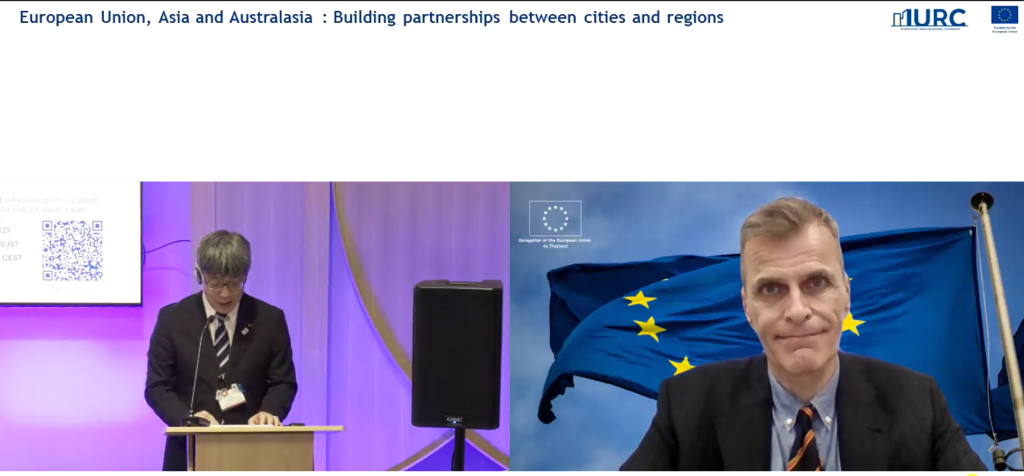
In his live-streamed welcoming address, Mr. Andreas Röttger, Head of the Asia Pacific Team at the EU Foreign Policy Instruments, expressed his gratitude to the Japanese Government and Osaka Prefecture for hosting the Expo and highlighted the importance of international cooperation in addressing urban challenges. Mr. Röttger emphasised the role of the IURC programme, launched in 2017, in promoting global knowledge exchange, noting that its new phase will broaden and deepen joint work, experimentation, knowledge sharing, and policy learning in an increasingly complex world. Mr Röttger stated: “I am honoured and proud to officially launch the second phase of the Asia and Australasia IURC programme to run until 2027, advancing the critical role of cities and regions as innovators. (…) Cities and regions are playing an increasingly central role in innovation, crafting locally responsive strategies, informed by the real needs on the ground, while also keeping an eye on broader global goals. (…) We look forward to seeing many new collaborations and solutions in the future”.
Mr. Hiroyuki Baba, Director General for Commerce, Industry and Labour, Government of Osaka Prefecture, warmly welcomed delegations and guests to the Osaka Expo 2025. Since joining the IURC Asia and Australasia programme in 2021, Osaka Prefecture has actively collaborated with partners such as Vale d’Oise (France), Emilia-Romagna (Italy), and Catalonia (Spain), with a focus on hydrogen energy and advanced air mobility. Mr. Baba expressed optimism about the continued advancement of innovation and business cooperation through the IURC project, highlighting its role in strengthening Japan-EU relations and driving mutual economic growth.
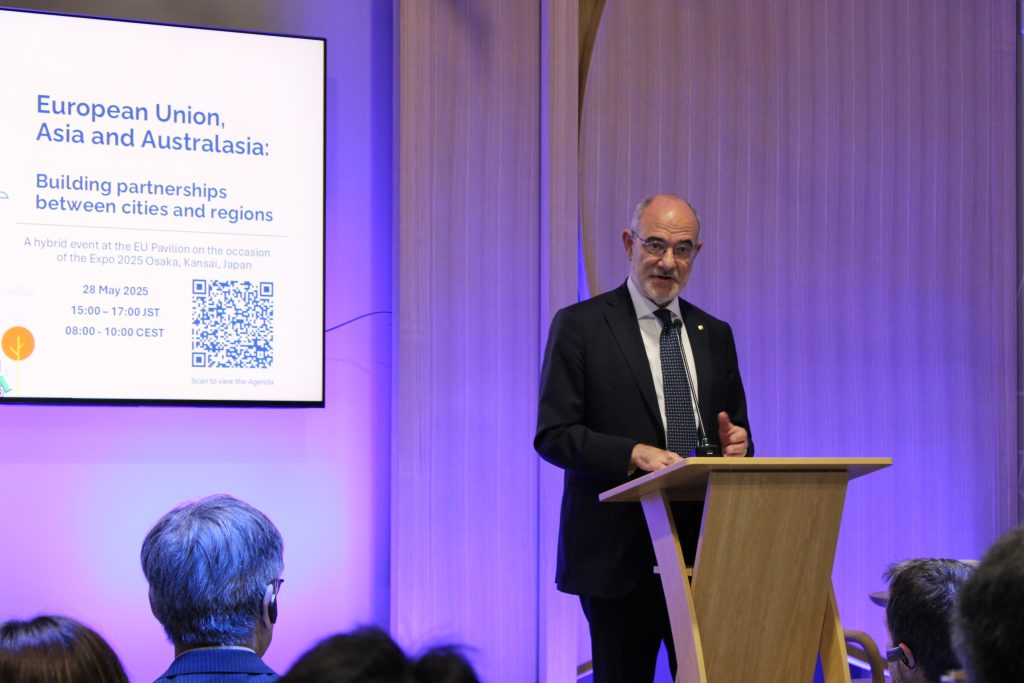
During his opening remarks, Mr. Jaume Duch Guillot, Regional Minister for the European Union and External Action, Government of Generalitat Catalonia, emphasised the deepening ties between Europe and Asia-Pacific, highlighted by the historic EU-Japan Strategic Partnership Agreement—the first of its kind between the EU and Japan. This agreement paves the way for stronger collaboration in technology, research, and innovation, he said. Referring to the seminar event’s motto, he mentioned that a bridge is, at the same time, a meeting place and a crossing point, a metaphor for the infinite opportunities created when different cultures join hands.
Mr. Duch Guillot noted: “When the value of science is being questioned in some places, Europe stands firm in defending open and collaborative research as the basis for development. The recent initiative “Choose Europe for Science” to attract the world’s brightest minds, between 2025 and 2027, is a good example of it. Catalonia steps up to this with the “Catalonian Talent Bridge” in partnership with 12 public universities. “Today, we celebrate how cities and regions from Europe, Asia, and Australasia are building bridges—region to region and city to city—working side by side on smart mobility, biotech, and digital transformation initiatives”, he resumed.
What’s in for Regions and Cities? A Panel Discussion
After the opening part of the seminar, Ms. Julianne Hughey (Christchurch), Mr. Masaaki Shibayama (Aichi), Ms. Aida Diaz (Catalonia) and Mr. Marco Mazziotti (Milan) joined a panel discussion moderated by the IURC Team Leader, Pablo Gándara.
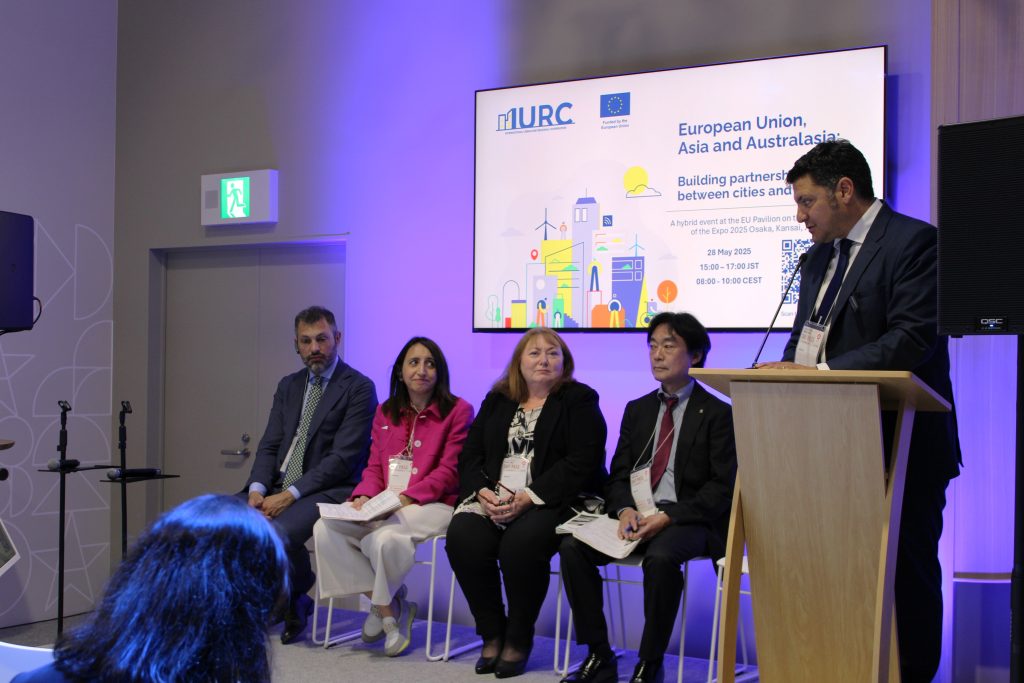
Christchurch Shares Success in International Collaboration Through IURC Programme
Ms. Julianne Hughey, City Initiatives Lead for Smart Christchurch at Christchurch City Council (CCC), presented the city’s achievements and outcomes of its collaboration with the IURC Asia and Australasia programme during the previous phase. Christchurch worked closely with the Spanish cities of Málaga and Vitoria-Gasteiz, focusing on key areas such as innovative, sustainable, and carbon-neutral ecosystems, as well as strategic sectors. The Smart Christchurch Programme oversees the city’s smart city initiatives and has served as one of the primary channels for engagement with the IURC programme. Ms. Hughey referred to several outcomes of the IURC cooperation, including a smart-city podcast and Málaga’s participation at the Innovation Expo in Christchurch. She also referred to Christchurch’s successful involvement in the European Commission’s Horizon Europe programme as a direct result of the IURC activities. The city has been selected as a demonstration city to roll out several climate resilience activities over the next few years.
Ms. Hughey said, “Being part of the IURC programme has been greatly beneficial. It has supported rapid learning to accelerate our actions, provided access to leading innovators and best practices, offered a platform to showcase Christchurch, and helped build very strong, purposeful relationships.”
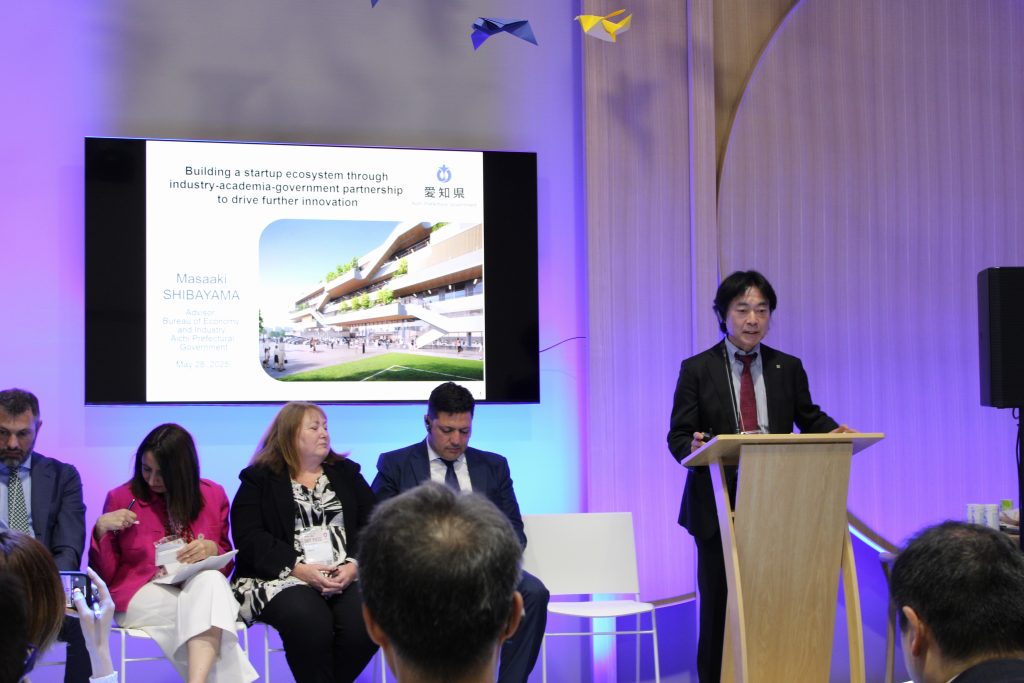
Aichi Prefecture Showcases Innovation and International Collaboration through IURC
Mr. Masaaki Shibayama, Advisor to the Department of Economy and Industry, Aichi Prefectural Government, shared outcomes of Aichi’s growing partnership with the EU through the IURC Asia and Australasia programme. As a major industrial hub in Japan, Aichi is accelerating innovation and startup growth through initiatives like Station Ai—a unique open innovation facility launched in October 2024, modeled after France’s Station F. With over 300 partner companies, Station Ai is emerging as a dynamic platform for global startup collaboration. Aichi is deepening its cooperation with European partners, particularly the Auvergne-Rhône-Alpes (France) region. A MoU signed between the two regions in 2022 has been further strengthened under the IURC through knowledge sharing, site visits, and the joint participation in industry events. The partnership reflects IURC’s role in linking innovation ecosystems across borders and supporting regional transformation through global cooperation.
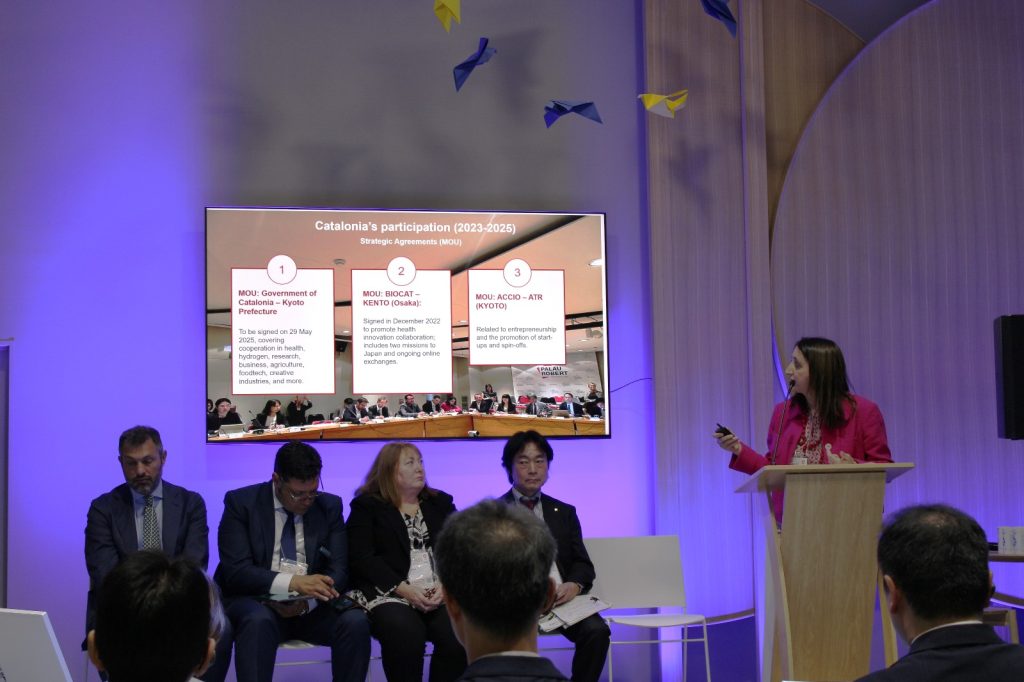
Catalonia Strengthens Ties with Japan Through IURC
Ms. Aida Diaz Saez, Director of the Internationalisation Program of the Department of Research and Universities (REU), Government of Catalonia, shared Catalonia’s strong alignment with the IURC programme, emphasising Japan’s strategic importance and the programme’s role in advancing Catalonia’s Japan Plan. She also highlighted the programme’s alignment with Agenda 2030 and the EU Cohesion Policy.
The IURC’s regional focus, thematic priorities, multilateral and international cooperation, and emphasis on technology, research, innovation, and tangible outcomes make it a highly relevant and strategic platform for Catalonia’s international engagement. The programme facilitates collaboration not only with Japanese regions but also with other EU partners, connecting Catalonia’s knowledge ecosystem with global stakeholders.
“The programme not only allows us to collaborate with Japanese regions,” Ms. Díaz Saez noted, “but also with other EU regions, which adds significant value.”
As a result of this cooperation, a Memorandum of Understanding with Kyoto Prefecture was signed on 29 May 2025, covering areas in health, hydrogen, business, food tech, and more.

Mr. Marco Mazziotti, Director of EU Direct Funding at Municipality of Milan, reflected on the legacy of Expo Milano 2015, held under the theme “Feeding the Planet, Energy for Life.” Expo 2015 marked a significant turning point in Milan’s legacy, transforming the city into a more European, creative, and attractive hub.
During the Expo, the City of Milan developed its own food policy strategy, which later evolved into the Milan Urban Food Policy Pact (MUFPP)—a global network of cities committed to building fairer and more sustainable urban food systems. The strategic reuse of the Expo site, which has been transformed into a thriving Center of Excellence for innovation in Italy and Europe. Through strong public-private partnerships and a long-term innovation system, Milan has repurposed the site into a dynamic innovation district, focusing on scientific research, life sciences, technology, sustainability, and start-up development.
The City of Milan, a leader in the EU Urban Agenda on Food Systems, played a key role in the previous phase of the IURC Asia and Australasia programme through its collaboration with Bangkok, Thailand and Milan Urban Food Policy Pact (MUFPP). This partnership contributed to the development and launch of Bangkok Food Policy 2023-2027. Building on this success, Milan expanded its collaboration to include the cities of Chiang Mai in northern Thailand and Bandung in Indonesia, strengthening regional engagement and promoting more sustainable urban food systems across Asia within the programme.
Closing Remarks
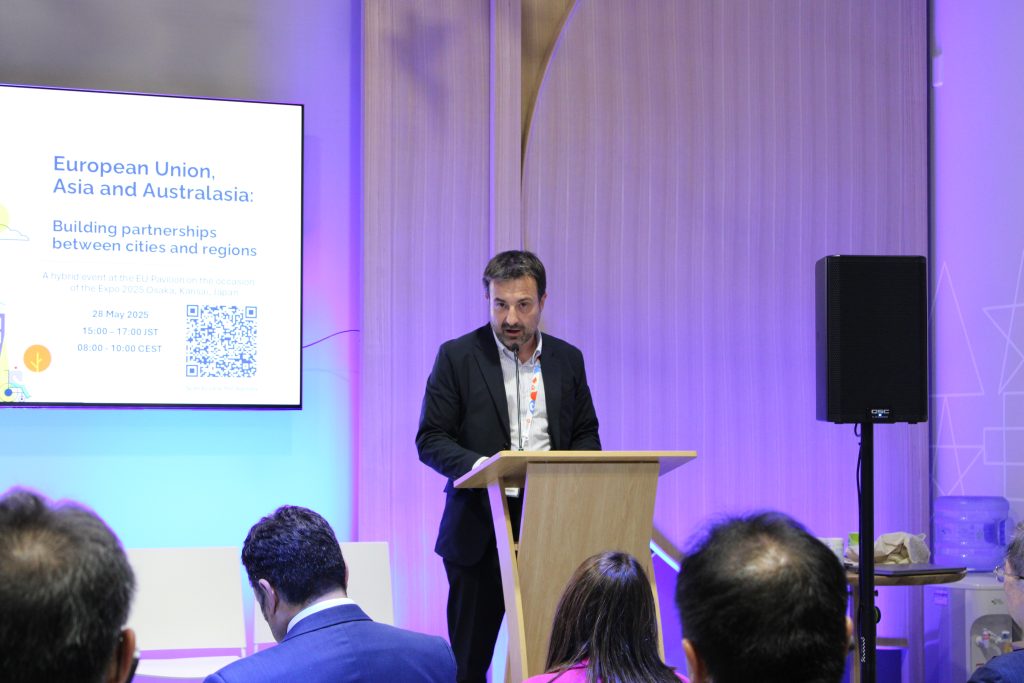
Mr. César Moreno from the Delegation of the European Union to Japan delivered the closing remarks, thanking all participants for their strong commitment to deepening cooperation between Europe, Asia, and Australasia. He stated that the event provided concrete examples of the shared values in Europe, Asia and Australasia with regard to sustainable growth, local governance, and cross-border collaboration.
Referring to the IURC programme’s new phase, Mr. Moreno noted, “This edition is ready to take flight,” and called for continued momentum to turn dialogue into real, impactful partnerships. “Let us take the momentum built here and carry it forward into real and sustainable partnerships that create tangible benefits for our communities. This is exactly what we have been doing over the past years, and I am confident we will continue to do so over the next two years and beyond,” said César Moreno from the Delegation of the European Union to Japan.
Applications are now open for European cities and regions to participate in the IURC programme activities with partnerships in Asia, Australia, Latin America, and the Caribbean.
Learn more and apply here: https://www.iurc.eu/2025/05/19/global-cooperation-opportunity-for-eu-cities-and-regions/
